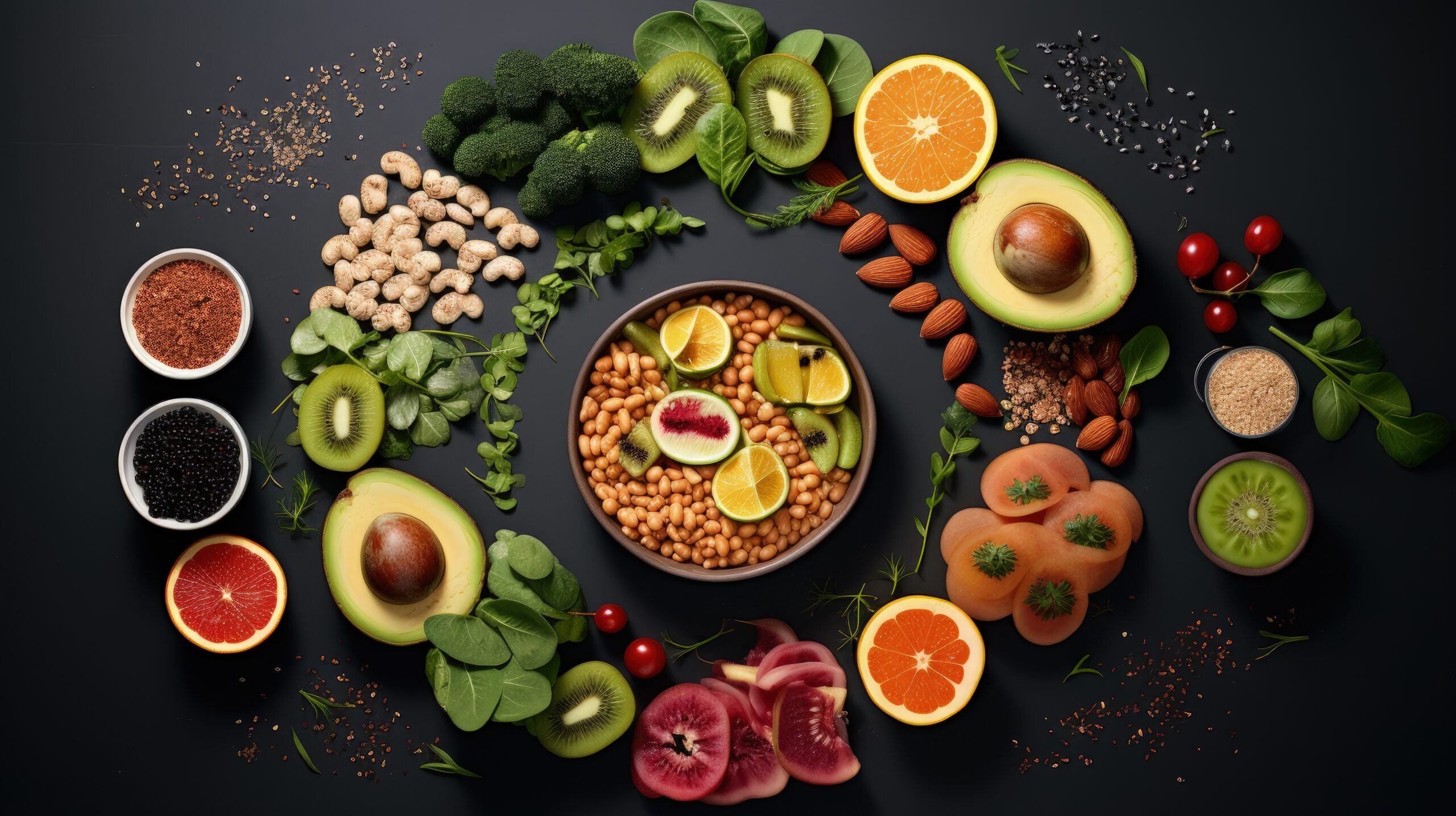Anti-inflammatory Foods To Treat and Prevent Crohn’s Disease
Harnessing the Power of Anti-Inflammatory Foods to Manage Crohn’s Disease
Crohn’s disease, a chronic inflammatory bowel condition, can bring discomfort and disruptions to daily life. While medical treatment plays a significant role in managing this condition, adopting a diet rich in anti-inflammatory foods can also contribute to symptom relief and improved overall health. In this article, we will explore the benefits of anti-inflammatory foods, including leafy greens, vegetables, mushrooms, fruits, legumes, whole grains, and seeds, in the context of treating and preventing Crohn’s disease.
Understanding Crohn’s Disease and Inflammation
Crohn’s disease is characterized by inflammation in the digestive tract, which can lead to symptoms such as abdominal pain, diarrhea, fatigue, and nutritional deficiencies. The inflammatory process plays a pivotal role in the disease’s progression. Incorporating anti-inflammatory foods into your diet can help reduce inflammation, alleviate symptoms, and potentially prevent flare-ups.

1. Leafy Greens
Leafy greens like spinach, kale, Swiss chard, and collard greens are rich in essential nutrients and antioxidants. They are high in fiber, which can promote regular bowel movements and support a healthy gut microbiome. The phytonutrients found in leafy greens have anti-inflammatory properties that can help reduce inflammation in the gut.
2. Vegetables
A diverse range of colorful vegetables should be a staple in your Crohn’s-friendly diet. Bell peppers, carrots, sweet potatoes, and broccoli are excellent choices. They provide vitamins, minerals, and fiber that support overall health and can help alleviate digestive discomfort.
3. Mushrooms
Mushrooms, such as shiitake and maitake varieties, contain compounds that have been shown to modulate the immune system and reduce inflammation. They can be a flavorful addition to various dishes and may contribute to Crohn’s symptom management.
4. Fruits
Fruits like berries, papaya, and bananas offer essential vitamins, antioxidants, and natural sweetness without excessive sugar content. These fruits are typically well-tolerated and can provide necessary nutrients for individuals with Crohn’s disease.
5. Legumes
Legumes like lentils, chickpeas, and black beans are excellent sources of plant-based protein and fiber. They can help maintain stable blood sugar levels and promote a feeling of fullness. When cooked thoroughly, legumes can be easier to digest for those with Crohn’s disease.
6. Whole Grains
Whole grains like oats, quinoa, and brown rice are rich in fiber, vitamins, and minerals. They contribute to digestive regularity and can support a balanced gut microbiome. Whole grains can also provide a steady source of energy, which can be particularly beneficial during periods of inflammation.
7. Seeds
Flaxseeds, chia seeds, and hemp seeds are packed with healthy fats, fiber, and essential nutrients. They have anti-inflammatory properties and can be sprinkled on yogurt, added to smoothies, or used as a topping for salads and cereals.
Incorporating Anti-Inflammatory Foods into Your Diet
Here are some practical tips on how to incorporate these anti-inflammatory foods into your diet while managing Crohn’s disease:
1. Gradual Introduction: When introducing new foods, especially those rich in fiber, do so gradually to allow your digestive system to adapt. Monitor your body’s response and adjust your intake accordingly.
2. Cooking Methods: Experiment with different cooking methods like steaming, roasting, or sautéing to make vegetables, leafy greens, and mushrooms more palatable and easier to digest.
3. Small, Frequent Meals: Eating smaller, more frequent meals can help reduce the workload on your digestive system and minimize discomfort.
4. Hydration: Stay well-hydrated by drinking plenty of water throughout the day. Proper hydration is essential for maintaining digestive health.
5. Avoid Trigger Foods: While incorporating anti-inflammatory foods, continue to avoid trigger foods that worsen your Crohn’s symptoms. Keep a food diary to track your reactions to specific foods.
6. Professional Guidance: Consult with a registered dietitian or healthcare provider who specializes in inflammatory bowel diseases. They can create a personalized meal plan tailored to your specific dietary needs and monitor your progress.
Incorporating anti-inflammatory foods into your diet can be a powerful tool in managing Crohn’s disease. These foods, including leafy greens, vegetables, mushrooms, fruits, legumes, whole grains, and seeds, provide essential nutrients, reduce inflammation, and support overall digestive health. However, it’s crucial to introduce these foods gradually and monitor your body’s response. Consulting with a healthcare provider or dietitian can provide valuable guidance in creating a Crohn’s-friendly meal plan that suits your individual needs. By embracing these nutrient-rich foods, you can take proactive steps towards alleviating symptoms, preventing flare-ups, and improving your overall well-being while living with Crohn’s disease.
Creating Anti-Inflammatory Recipes for Crohn’s Disease Management

Crohn’s disease, a chronic inflammatory bowel condition, necessitates dietary adjustments to manage symptoms effectively. One approach is to create anti-inflammatory recipes tailored to your specific needs. These recipes can not only help alleviate discomfort but also make mealtime an enjoyable and nourishing experience. In this article, we’ll explore ways to craft new recipes that prevent inflammation and support your Crohn’s disease management.
Choose Anti-Inflammatory Ingredients: The foundation of an anti-inflammatory recipe lies in its ingredients. Opt for foods known to possess anti-inflammatory properties, such as:
- Fatty Fish: Salmon, mackerel, and sardines are rich in omega-3 fatty acids, which have anti-inflammatory effects.
- Leafy Greens: Spinach, kale, and Swiss chard are high in vitamins, minerals, and antioxidants.
- Berries: Blueberries, strawberries, and raspberries contain phytonutrients that combat inflammation.
- Turmeric: This spice contains curcumin, a potent anti-inflammatory compound.
- Ginger: Known for its anti-inflammatory and digestive benefits.
- Olive Oil: Extra virgin olive oil is a healthy fat that can help reduce inflammation.
- Nuts and Seeds: Almonds, walnuts, flaxseeds, and chia seeds are rich in anti-inflammatory nutrients.
Incorporate Gut-Friendly Foods: Since Crohn’s disease primarily affects the digestive tract, it’s crucial to incorporate gut-friendly foods into your recipes. These include:
- Probiotic Foods: Yogurt, kefir, sauerkraut, and kimchi contain beneficial bacteria that support gut health.
- Fiber-Rich Ingredients: Choose soluble fiber sources like oats, bananas, and sweet potatoes, which can ease digestion.
Mindful Cooking Techniques: The way you prepare and cook ingredients can impact their anti-inflammatory properties. Consider these techniques:
- Steaming: This gentle cooking method retains nutrients and minimizes potential irritants in vegetables.
- Sautéing: Use olive oil or avocado oil for sautéing; these healthy fats can reduce inflammation.
- Baking: Roasting or baking vegetables can bring out their natural sweetness and enhance flavor.
Avoid Trigger Foods: Identify and avoid trigger foods that worsen your Crohn’s symptoms. Common triggers include dairy, spicy foods, processed meats, and high-fiber foods. Substitute these ingredients with alternatives that suit your dietary needs.
Experiment with Flavorful Spices: Enhance the taste of your anti-inflammatory recipes with flavorful spices like turmeric, ginger, cinnamon, and cumin. These spices not only add depth to your dishes but also provide anti-inflammatory benefits.
Recipe Ideas for Crohn’s-Friendly Anti-Inflammatory Meals
Now, let’s explore some practical recipe ideas that incorporate these anti-inflammatory principles:
1. Salmon and Quinoa Bowl
Ingredients:
- Grilled salmon fillet
- Cooked quinoa
- Steamed broccoli and spinach
- Sliced avocado
- Olive oil and lemon dressing
- Chopped fresh herbs (parsley, dill, or cilantro)
2. Berry Smoothie Bowl
Ingredients:
- Mixed berries (blueberries, strawberries, raspberries)
- Greek yogurt or a dairy-free alternative
- Banana
- Honey or maple syrup (optional)
- Topped with nuts, seeds, and granola
3. Turmeric-Ginger Vegetable Stir-Fry
Ingredients:
- Mixed vegetables (bell peppers, carrots, zucchini)
- Tofu or chicken (optional)
- Turmeric and ginger paste
- Low-sodium soy sauce or tamari
- Brown rice or cauliflower rice
4. Gut-Friendly Oatmeal
Ingredients:
- Rolled oats or steel-cut oats
- Sliced banana
- Chia seeds
- Almond butter or peanut butter (if tolerated)
- A drizzle of honey (optional)
5. Greek Yogurt Parfait
Ingredients:
- Greek yogurt or dairy-free yogurt
- Mixed berries
- Honey or agave syrup (optional)
- Granola or crushed nuts for crunch
Creating anti-inflammatory recipes tailored to your needs is a proactive step in managing Crohn’s disease while enjoying delicious and nourishing meals. By carefully selecting anti-inflammatory ingredients, incorporating gut-friendly foods, and mindful cooking techniques, you can craft dishes that support your health and well-being. Experiment with flavors, spices, and ingredient substitutions to find the perfect balance for your palate and digestive comfort. Remember that everyone’s triggers and tolerances are different, so it’s essential to keep a food diary and consult with a healthcare provider or dietitian for personalized guidance. With creativity and attention to your body’s signals, you can savor a variety of flavorful meals while promoting gut health and reducing inflammation in the process.
Advice On How to Stay Strict With Your New Diet to Avoid Inflammation
Maintaining a strict diet to avoid inflammation with Crohn’s disease can be a daunting task, but it’s essential for managing the condition effectively and improving your quality of life. One of the most critical pieces of advice is to educate yourself thoroughly about Crohn’s disease and its dietary implications. Understanding how certain foods can trigger inflammation in your digestive tract will not only motivate you but also provide a strong rationale for adhering to a strict diet. Keeping a food diary is a practical step that can significantly aid in your dietary discipline. This diary should be detailed, tracking not only what you eat but also how it impacts your symptoms. By maintaining this record, you can identify trigger foods and patterns of inflammation, empowering you to make informed decisions about your diet. It becomes a valuable tool for understanding your body’s specific responses to different foods.
Meal planning is another essential strategy. By planning your meals in advance, you reduce the chances of making impulsive food choices that may lead to inflammation. When you have a well-thought-out meal plan, you ensure that Crohn’s-friendly options are readily available, even on busy days. To make meal planning more effective, stock your kitchen with anti-inflammatory ingredients while removing trigger foods. This proactive step makes it easier to prepare compliant meals, as you won’t have tempting but harmful options at your fingertips. Dedicate time to meal preparation by cooking and portioning anti-inflammatory dishes for the week, ensuring that you have convenient access to safe and nourishing meals.
Additionally, it’s crucial to seek support from your social network. Inform your friends and family about your dietary restrictions and explain the importance of adhering to them. When your loved ones understand your condition and are aware of the significance of your diet, they can provide essential emotional support, resist the temptation to offer you non-compliant foods, and help you stay accountable. Understanding how to read food labels is another vital skill. Familiarize yourself with label information to spot potential trigger ingredients. Avoid products that contain additives, preservatives, or substances you know are problematic for you. This attention to detail is essential, especially in today’s food market, where many products contain hidden ingredients that can cause inflammation.
Practicing mindful eating can also aid in maintaining your dietary discipline. Slow down and savor each bite, chewing thoroughly, and paying close attention to how your body responds to different foods. By being in tune with your body, you can recognize early signs of discomfort and make adjustments as needed. Staying well-hydrated is paramount, as dehydration can exacerbate Crohn’s symptoms. Drink plenty of water throughout the day to support digestion and overall gut health. This simple habit is often overlooked but can have a significant impact on your well-being.
When you encounter challenges or need guidance in managing your Crohn’s-friendly diet, don’t hesitate to ask for help from a registered dietitian or nutritionist who specializes in inflammatory bowel diseases. Their expertise can provide you with tailored meal plans, strategies, and ongoing support to ensure you maintain your dietary discipline effectively. Finally, it’s essential to accept and embrace the limitations imposed by your dietary restrictions. Recognize that these limitations are not a hindrance but a means to regain control over your health and improve your quality of life. By accepting this reality and focusing on the positive outcomes of a strict diet—such as symptom relief and enhanced well-being—you can stay motivated and committed to managing Crohn’s disease through your dietary choices.
Anti-Inflammatory Foods to Help With Crohn’s Disease FAQ
1. What are anti-inflammatory foods, and why are they important for Crohn’s disease management?
- Answer: Anti-inflammatory foods are those that have properties known to reduce inflammation in the body. In the context of Crohn’s disease, they are crucial because chronic inflammation in the digestive tract is a hallmark of the condition. Consuming anti-inflammatory foods can help alleviate inflammation and potentially reduce the frequency and severity of symptoms.
2. Can anti-inflammatory foods completely replace medication in managing Crohn’s disease?
- Answer: While anti-inflammatory foods can be a valuable component of Crohn’s disease management, they should not be considered a sole replacement for medication. Medication prescribed by your healthcare provider is essential to control inflammation and prevent complications. Anti-inflammatory foods complement medical treatment and can contribute to symptom relief and overall well-being.
3. What are some common anti-inflammatory foods that individuals with Crohn’s disease can include in their diet?
- Answer: Common anti-inflammatory foods suitable for Crohn’s disease management include leafy greens (spinach, kale), fatty fish (salmon, mackerel), berries (blueberries, strawberries), ginger, turmeric, nuts (almonds, walnuts), seeds (flaxseeds, chia seeds), and whole grains (quinoa, brown rice). These foods are rich in antioxidants, healthy fats, and nutrients that can help reduce inflammation.
4. Are there any foods that individuals with Crohn’s disease should avoid, even if they are not explicitly pro-inflammatory?
- Answer: Yes, some foods may not be explicitly pro-inflammatory but can still aggravate Crohn’s disease symptoms. These include high-fiber foods, spicy foods, dairy products (due to lactose intolerance), and foods with added sugars or artificial additives. The tolerance to such foods varies from person to person, so it’s essential to identify personal trigger foods through careful observation.
5. How can I incorporate anti-inflammatory foods into my daily meals effectively?
- Answer: To incorporate anti-inflammatory foods into your daily meals, consider creating balanced and varied meal plans. Start with small changes, gradually introducing these foods into your diet to allow your digestive system to adapt. Plan meals that include a mix of anti-inflammatory ingredients and use mindful cooking techniques such as steaming, sautéing in healthy fats, and baking. Work with a registered dietitian or healthcare provider to develop personalized meal plans and dietary strategies tailored to your specific needs and preferences.

